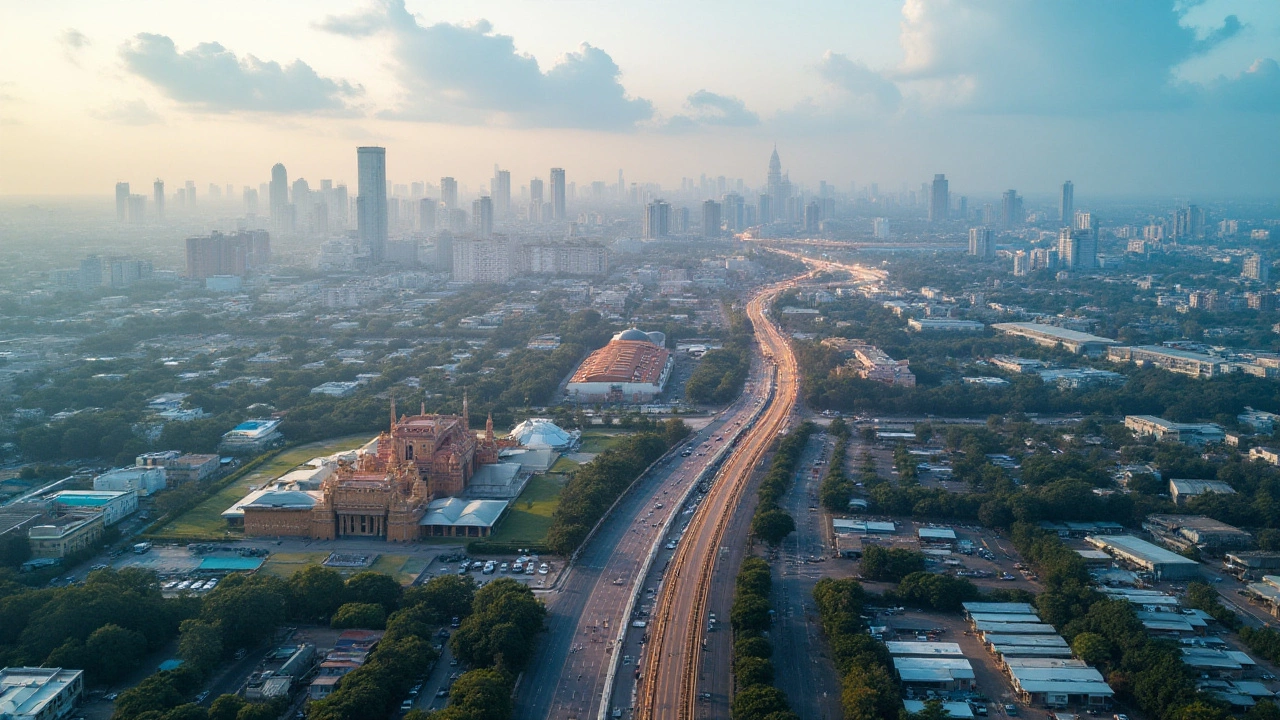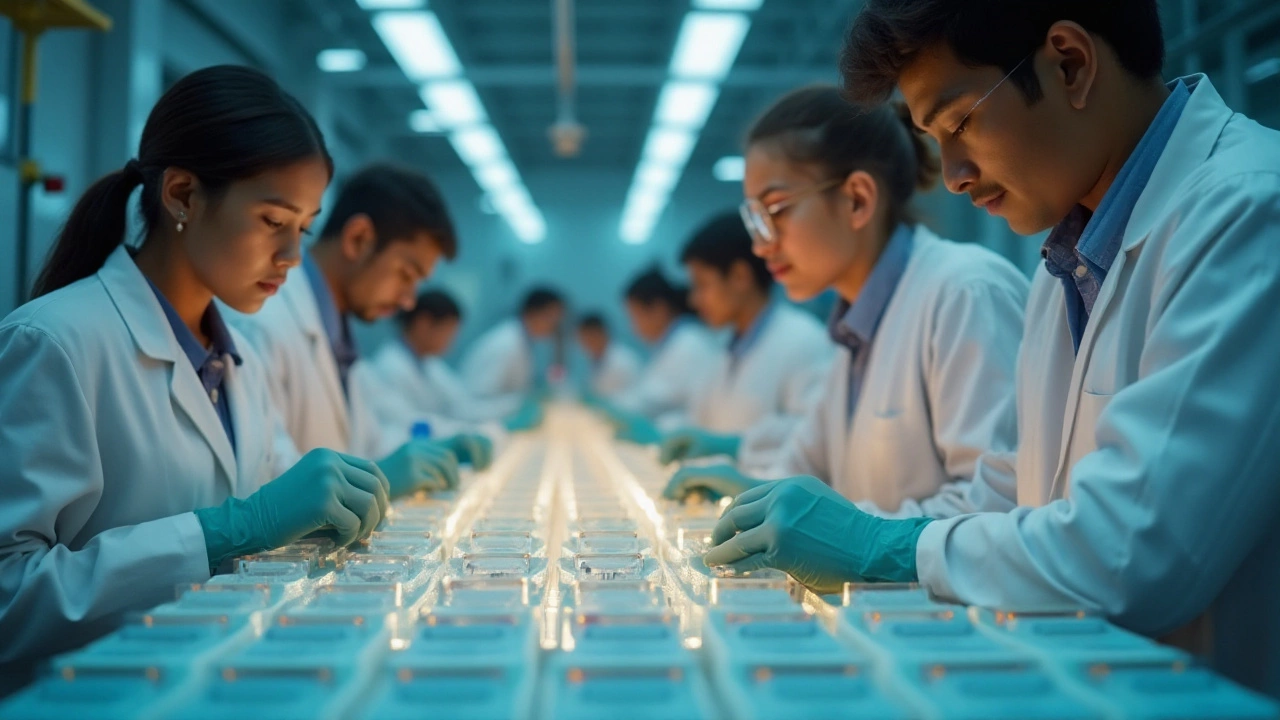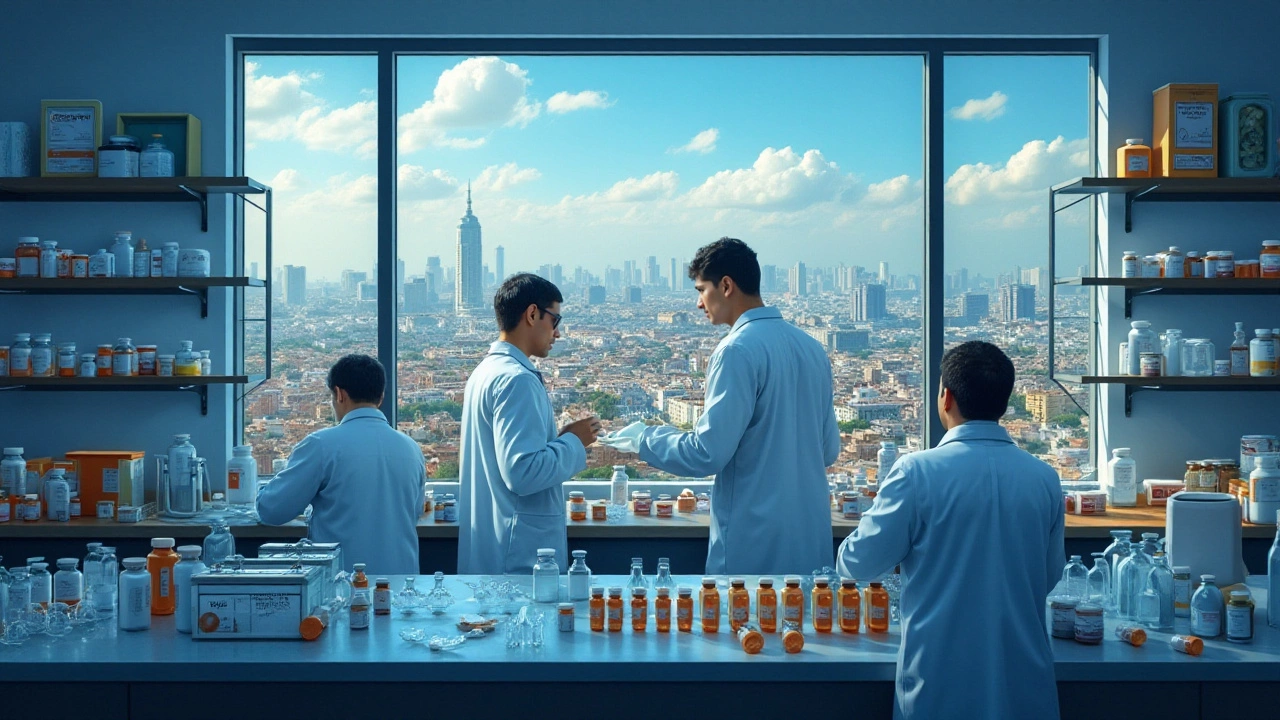Hyderabad's moniker as the 'Pharma Hub' of India isn't just a label—it's a testament to the city's pivotal role in the growth and success of the country's pharmaceutical sector. Nestled in the southern part of India, Hyderabad's transformation into a pharmaceutical powerhouse is intriguing and worth exploring. From modest beginnings to housing some of the largest pharmaceutical companies, the city embodies a blend of tradition and innovation. Its commitment to pharmaceutical excellence is reflected in its modern infrastructure, a thriving pool of skilled professionals, and a strategic focus on research and development.
As we delve into the expansive journey of Hyderabad's pharmaceutical industry, we uncover the unique ingredients that have fueled its meteoric rise. These include the supportive policies laid down by the government, the collaborative spirit of industry players, and the strategic utilization of resources. Each factor plays a crucial role in making Hyderabad the buzzing center of pharma manufacturing it is today. Interested in knowing what it takes for a city to earn such a prestigious title? Let’s unravel the story behind Hyderabad's ascent to the summit of India's pharmaceutical landscape.
- Historical Background and Growth
- Key Contributions of Hyderabad’s Pharma Industry
- Government Initiatives and Support
- Challenges and Future Prospects
Historical Background and Growth
The evolution of Hyderabad as the foremost pharma hub in India is a captivating saga of ambition, perseverance, and strategic foresight. The seeds for this transformation were sown in the early 1960s when Indian pharmaceutical companies began to flourish with the backing of visionary industrialists and the government’s supportive stance towards indigenous medicinal solutions. Initially, the industry concentrated on imitating patented drugs that were unaffordable, facilitating a more affordable health care system in India. This ingenuity laid a solid foundation, allowing Hyderabad to attract and support a plethora of pharmaceutical entities that were eager to establish their roots in the fertile grounds of innovation.
Throughout the 1970s and 1980s, the city's pharma sector expanded steadily, supported by the establishment of firm governmental policies such as the Patent Act of 1970, which redefined the pharmaceutical landscape by favoring process patents over product patents. These pivotal years witnessed the rise of promising companies like Dr. Reddy's Laboratories and Aurobindo Pharma. These companies didn't just cater to the local markets; they ambitiously expanded their horizons to include international markets, making Hyderabad not just significant at a national level, but a noteworthy contender on the global stage. During this period, academia and industry collaboration started gaining traction, leading to the cultivation of a workforce that was both skilled and innovative.
In the late 1990s, the trajectory of Hyderabad's pharmaceutical success story took a steep upward curve. A robust surge in foreign direct investments and relaxed economic policies opened up the Indian pharma sector to global alliances. The formation of biotech parks and special economic zones further fueled this growth, carving out a niche for biotechnology alongside the established pharmaceutical prowess. An infusion of global technologies, coupled with local talent, saw the birth of versatile biosimilars and advanced generic drugs, turning Hyderabad into a bustling center of innovation. A senior pharmaceutical analyst once remarked,
"Hyderabad's strategic location, combined with its remarkable ability to integrate scientific prowess and modern technologies, is second to none in India."
The early 21st century ushered in a new era of growth. Global pharmaceutical conglomerates chipped in with their investments, advancing research and development capacities across the board. Simultaneously, local startups started making their mark, driven by a young crop of entrepreneurs and researchers eager to push the boundaries of science. Most remarkably, these years saw an emphasis on refining healthcare solutions via partnerships across continents, particularly with Western markets. Hyderabad, often referred to as the pharmaceutical industry's esteemed powerhouse, didn’t hesitate to forge alliances that focused on mutually beneficial outcomes, thereby accelerating innovations in drug discovery and clinical research.
As Hyderabad continues to advance its standing in the pharmaceutical domain, challenges persist. The industry remains vigilant against hurdles such as regulatory changes, price controls, and compliance demands. Yet, the city's resolve in fostering sustainable and dynamic growth paths appears unyielded. The synergies between government policies, academia, and industrial bodies remain pivotal as Hyderabad aims for heightened levels of success. So, what more to expect from the city that's already known as the beating heart of India's pharmacy sector? Only time will tell, as it navigates an evolving global landscape and adapts to emerging healthcare needs. With the undeterred backing of its knowledge-rich resources and unwavering ambition, Hyderabad is poised to kindle the next chapter of its inspiring journey in pharma manufacturing.

Key Contributions of Hyderabad’s Pharma Industry
Hyderabad has emerged as the epicenter of India's pharmaceutical landscape, boasting a unique blend of traditional knowledge and cutting-edge innovation. The city's pharmaceutical industry is responsible for over a third of the country's pharmaceutical production, a staggering feat that highlights its integral role in the sector. One of the standout contributions of Hyderabad is its leadership in the pharmaceutical industry, serving as a home base for major companies like Dr. Reddy's Laboratories, Aurobindo Pharma, and Divi's Laboratories. These giants have not only boosted local economies but have also put India on the global pharmaceutical map.
The establishment of Genome Valley, an iconic biotech park just outside the city, has been a game-changer, attracting biotech companies and nurturing an ecosystem of research and development. This area has become a hub for innovation, with a particular emphasis on cutting-edge life sciences research, vaccines, and drug discovery. Many Indian as well as international firms have set up their labs here, leveraging the collaboration opportunities presented by Hyderabad's rich scientific community. This environment fosters not just mass production but also the development of specialized drugs, often tailored to global pharmaceutical needs.
Hyderabad’s strategic location plays a noteworthy role, offering convenient access to both domestic and international markets. The city's well-developed transportation infrastructure ensures efficient supply chain management, reducing costs and delivery times for raw materials and finished goods alike. The presence of Rajiv Gandhi International Airport facilitates rapid cargo shipments worldwide, significantly enhancing the competitive advantage of companies within the region. Reports indicate that Hyderabad has regularly contributed to a lion’s share of India’s pharmaceutical exports, underlining its strategic economic impact.
"Hyderabad’s pharmaceutical industry has really mastered the art of combining efficient production techniques with innovative research, driving India's success in the global market," said a representative from the Indian Pharmaceutical Alliance.
Fueled by a talented and educated workforce, Hyderabad is home to an impressive array of scientists, engineers, and professionals who continue to push the boundaries of what is possible in the pharmaceutical field. Many institutions offer degree programs specializing in pharmaceutical sciences, biotechnology, and healthcare, providing a continuous stream of qualified professionals. This significant availability of skilled human resources ensures that companies can innovate and produce at exceptional rates while maintaining stringent quality standards.
Government initiatives have been instrumental in fostering this fertile environment. Policies supporting industrial growth, research grants, tax incentives, and the development of industrial parks have proved to be robust pillars in Hyderabad's pharma success story. These supportive measures have propelled Hyderabad to the forefront of not just the Indian market but also globally, allowing it to serve as a model city for pharmaceutical growth and development. The government’s continued push for innovation and industrial support ensures that Hyderabad’s position as a pharma hub remains strong well into the future.

Government Initiatives and Support
As the city known as India's "Pharma Hub," Hyderabad owes much of its success to well-crafted government policies that have effectively nurtured its ambitions. These initiatives are not just incremental steps but are structured efforts to create an ecosystem where the pharmaceutical industry can thrive unencumbered. One of the cornerstones of government support is the formation of dedicated industrial clusters, such as the Genome Valley. This is India’s first state-of-the-art life sciences R&D and clean manufacturing hub, which offers cutting-edge infrastructure that attracts global life sciences companies.
The initiatives extend into the realm of fiscal incentives and subsidies designed to lower entry barriers for entrepreneurs and established companies alike. For instance, the Telangana government's Pharmaceutical and Chemical Promotion Policy offers tax breaks, while facilitating clearances and endorsements through its single-window clearance system. The ease of doing business in Hyderabad is further amplified by its strategic location, offering logistical advantages for both acquisition of raw materials and distribution of finished products.
Another cardinal aspect is the allocation of significant funding towards higher education, focusing on life sciences and pharmaceuticals. This ensures that the workforce remains not only skilled but also innovative and adaptable. To this end, partnerships have been forged with educational institutions to encourage research and development. The government is also committed to enhancing quality control measures, employing advanced technologies to maintain the city’s reputation for high-quality pharmaceutical exports.
In a statement encapsulating the cooperative dynamic between the industry and government, K. Chandrashekar Rao, Chief Minister of Telangana, once remarked,
"Our government considers the pharmaceutical industry a key pillar for robust economic growth, focusing our efforts to provide an industry-friendly expansion environment."This collaboration is underscored by regular dialogues between policymakers and industry leaders, ensuring that the regulations and strategies remain relevant and effective.
Emerging trends suggest an increasing governmental emphasis on sustainable practices. Initiatives are underway to promote the use of eco-friendly technologies across pharmaceutical manufacturing processes, adding another layer of appeal for global companies seeking sustainable operations. These measures serve not only to protect local environments but also to align with international ethical standards, thus opening even more doors of opportunity in global markets.

Challenges and Future Prospects
As Hyderabad continues to thrive as India's Pharma Hub, the city faces several challenges that need to be addressed to maintain its leading position in the pharmaceutical industry. One significant challenge is the increasing competition from other regions within India and globally. Cities such as Bengaluru and Pune are making substantial investments in their infrastructure and workforce to attract pharmaceutical companies. Internationally, countries like China are ramping up their production capabilities, which poses a tough competition for Hyderabad's market share.
The industry in Hyderabad also grapples with regulatory challenges. Despite the supportive government policies, navigating the complex web of regulations can be overwhelming for many small and medium-sized enterprises (SMEs). These regulatory hurdles often cause delays in drug approvals and impede the speed of bringing new products to market. Addressing these regulatory bottlenecks requires concerted efforts from both industry stakeholders and policymakers to streamline processes and enhance transparency.
Infrastructure, although robust, needs continuous upgrades to support the growing demands of the pharmaceutical sector. The development of world-class research centers and laboratories is essential to foster innovation and research in new medical fields. This aspect is vital, as India's position in the world pharmaceutical market is not only dependent on low-cost manufacturing but also on driving forward cutting-edge research and development.
"Innovation is at the heart of the pharmaceutical industry, and for Hyderabad to remain a leader, it must continue to push the boundaries of research," says a renowned industry expert.
Looking to the future, Hyderabad's prospects in the pharmaceutical industry are bright, provided it adapts to emerging trends and technologies. Embracing digital transformation can significantly enhance production efficiency and reduce operational costs. Technologies such as artificial intelligence, blockchain, and big data analytics are already redefining pharma logistics and manufacturing processes. By harnessing these innovations, Hyderabad's firms can improve decision-making and remain competitive on the global stage.
Another key area for future growth is the focus on sustainable manufacturing practices. The increasing awareness and demand for eco-friendly production methods press upon Hyderabad's pharmaceutical companies to adopt more sustainable practices. This step not only ensures compliance with environmental regulations but also enhances the global image of Hyderabad as a city committed to sustainability. Support from both government and industry players is crucial to develop and implement these green technologies.
In conclusion, while challenges persist, the future of Hyderabad as India's preeminent Pharma Hub largely depends on its ability to innovate and adapt. With the right strategies, continuous support from the government, and a willingness to embrace change, Hyderabad is well-positioned to maintain its leadership and drive significant growth in the Indian and global pharmaceutical industry. The confluence of these efforts will ensure that Hyderabad not only meets the current challenges head-on but also seizes the opportunities for progress and prosperity in the pharmaceutical sector.
